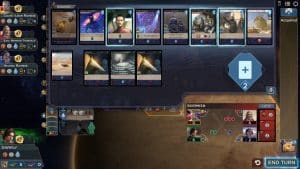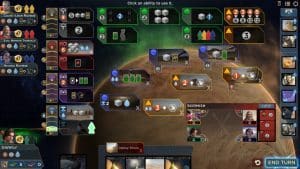Dune: Imperium
Related Games
Description
🔥 What is Dune: Imperium?
Dune: Imperium is a strategic deck-building and worker placement game developed by Dire Wolf Digital. Based on the Dune franchise, the game blends elements of politics, warfare, and resource management into a competitive board game experience brought to life on PC. Set in the politically complex and dangerous world of Arrakis, players assume leadership of one of the Great Houses, vying for influence, control of spice, and ultimate dominance.
The digital version maintains the deep strategy and tension of the tabletop version while offering AI opponents, campaign progression, and online multiplayer. With its faithful adaptation of the Dune universe and strong replayability, Dune: Imperium caters to both strategy enthusiasts and fans of Frank Herbert’s legendary sci-fi saga.
👉 Features of Dune: Imperium
Deck-Building and Tactics
Players build a deck of cards that determines their actions and strategy. Cards provide access to locations, special abilities, or combat advantages. Every draw shapes your options, requiring careful planning and adaptation to opponents’ moves. Crafting a flexible and synergistic deck becomes essential for maximizing efficiency and responding effectively to changing game states.
Worker Placement Mechanics
Each turn, players place agents on the board to perform actions such as harvesting spice, forming alliances, recruiting troops, or negotiating political influence. The limited number of agents forces tough decisions every round. Strategic placement is crucial for blocking opponents, securing key positions, and optimizing resource generation. The depth of decision-making is amplified by the evolving board state and the unpredictability of rival moves.
Dynamic Conflict System
At the end of each round, players engage in combat over critical rewards. Committing troops and using combat-specific cards adds tactical layers. Winning conflicts can turn the tide of the game by granting resources or strategic advantages. Combat involves bluffing, hand management, and careful timing. Players must assess the cost of engagement against potential rewards, making each conflict an intense, high-stakes affair.
Influence and Diplomacy
Alliances with factions like the Fremen, Spacing Guild, Bene Gesserit, or Emperor provide powerful bonuses. Influence levels fluctuate based on gameplay, making diplomacy and timing crucial to strategic growth. Faction relationships are dynamic, and smart players will monitor rival allegiances while maintaining their own balance of power. Influence races can determine victory.
Campaign Mode and Challenges
The digital version features a single-player campaign with unique scenarios and AI rivals. Difficulty scaling, challenge objectives, and progression elements add variety and depth to repeat playthroughs. Special rulesets, themed missions, and narrative-driven challenges offer a more curated and rewarding solo experience.
Online and Solo Modes
Players can compete online against others or test their skills against AI in offline mode. Multiplayer matches offer ranked and casual formats with leaderboard integration and matchmaking options. Whether competing with friends or climbing the ranks, the smooth online system adds to the game’s long-term appeal.
Gameplay
Strategic Resource Management
Managing spice, water, Solari, and troops is key to long-term success. Resource scarcity and competition drive interaction and tension throughout the match. Each resource serves distinct purposes and is often required in tandem, demanding careful budgeting and trade-offs. Efficient economic management underpins all other strategies.
Turn-Based Structure with Phases
Each round is divided into phases: Reveal, Agent placement, Combat, and Cleanup. This structure ensures clarity and balance, allowing players to execute their plans and adapt to board changes in real time. Phases create a rhythmic flow of tension and release, with the Reveal phase serving as a critical moment for executing plans and adjusting tactics.
Tactical Card Usage
Cards serve dual purposes played for actions during placement or for effects during the Reveal phase. Choosing when to use cards and how to construct your deck determines tempo and adaptability. Proper deck construction allows for combo plays, faction synergy, and reactionary tactics, adding substantial depth to hand and deck management.
Victory Points and Game End Conditions
Players earn victory points through combat wins, faction influence, and specific card effects. The game ends when a player reaches 10 points, adding urgency to decision-making and encouraging aggressive or defensive shifts. Planning for a timely push while preventing others from reaching the threshold first creates constant pressure.
Replayability and Strategic Depth
Variable starting setups, hidden information, card variety, and player-driven narratives ensure high replay value. Each match requires different strategic approaches based on house selection, draw order, and rival behavior. The evolving metagame rewards experimentation and rewards players who develop adaptive, long-term planning skills.
Graphics of Dune: Imperium
Clean UI and Visual Clarity
The interface is minimalistic yet thematic, helping players focus on gameplay. Action icons, resource counters, and faction indicators are intuitively designed for quick understanding. Menus and tooltips offer concise information, aiding both learning and expert-level play.
Thematic Art Style
Artwork reflects the gritty, high-stakes politics and sci-fi setting of the Dune universe. Characters and factions are visually distinct and contribute to immersion in the lore. Visual motifs like spice storms, House sigils, and Arrakis landscapes root the experience in familiar themes from the source material.
Animation and Feedback Design
Subtle animations for combat, placement, and card usage add life to the game without overwhelming the player. Visual feedback enhances understanding of actions and consequences. Card reveals, troop deployments, and conflict results are visually satisfying, adding polish and reinforcing clarity.
Pros and Cons
✔️ Pros
- Deep strategic gameplay combining deck-building and worker placement
- Faithful adaptation of the Dune universe
- Engaging single-player and multiplayer options
- High replay value with variable conditions
- Balanced mechanics that reward planning and adaptability
❌ Cons
- Steep learning curve for new players
- AI behavior may become predictable over time
- Lack of narrative depth outside campaign mode
- Minimal animations may feel too simple for some players
ℹ️ Game information
Release Date: 13/03/2024
Update Date: 15/07/2025
Version: v3.2.1
Genre: Simulation / Strategy
Platform: PC
Language: ![]()
![]()
![]()
![]()
![]()
![]()
![]()
![]()
Weight: 5 GB
Additional info: New version includes all DLCs to date
⭐ Installation Instructions
- The game is fully complete, you just need to install it, so there is no need to unpack it or download it from other sources.
- Just run the Dune: Imperium.exe installation file.
- Simply launch the game from shortcut desktop.
⚙️ System Requirements
✅ Minimum:
- OS: Windows 10 64-bit
- Processor: Intel Core i5-2400 / AMD Ryzen 3 2200G
- Memory: 4 GB RAM
- Graphics: Intel HD 2000 / AMD Vega 8
- DirectX: Version 11
- Network: Broadband Internet connection
- Storage: 5 GB available space
✅ Recommended:
- OS: Windows 10 64-bit
- Processor: Intel Core 2 Duo E6600 / AMD Athlon 64 X2 5000+
- Memory: 8 GB RAM
- Graphics: NVIDIA GeForce 8800 GT (512 MB) / ATI Radeon HD 4850 (512 MB)
- DirectX: Version 11
- Network: Broadband Internet connection
- Storage: 5 GB available space
Images








